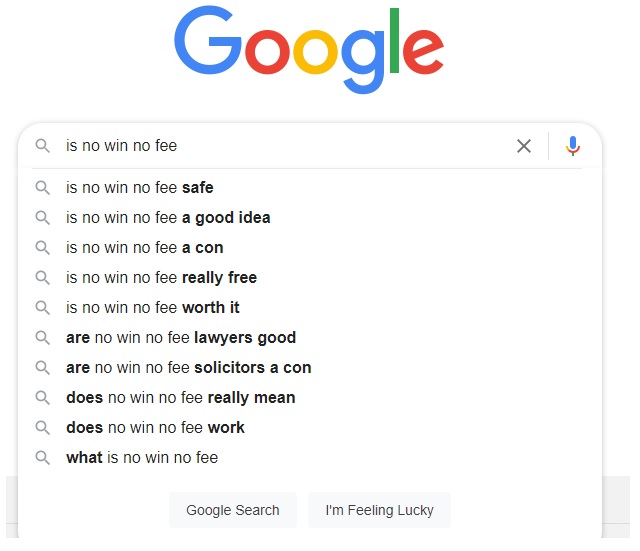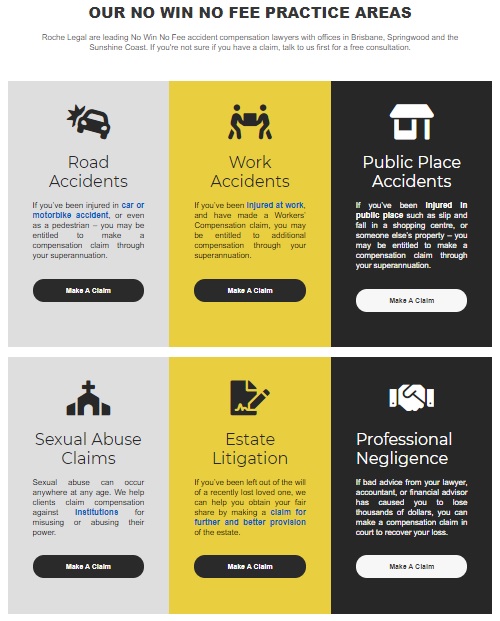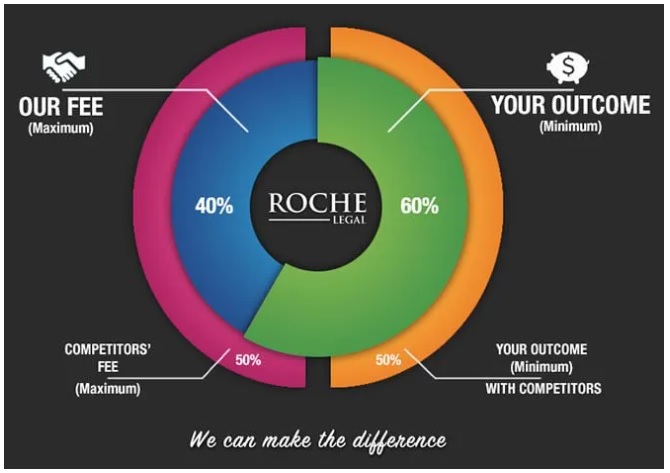A Step-by-Step Guide on How to Choose the Best Lawyer for Your Case

Important Note: In Queensland, providing legal services on a no win no fee basis for family law or criminal law matters is illegal - so law firms typically only offer no win no fee services with respect to claims for compensation and potentially estate litigation. This guide focuses on no win no fee arrangements for compensation claims only.
Making a compensation claim can be often confusing and for some people downright scary.
From legal jargon to complex documents, intimidating insurance company representatives, confusing deadlines and damage estimations, there are various aspects to be considered when making compensation claims, many of which can seem complicated or can be easily overlooked or misunderstood by an untrained person.
You might have asked yourself:
- Where should I start?
- Do I even need a lawyer in the first place?
- How do I know which law firm to choose?
This guide is designed to answer just that.
It will focus on providing a better understanding of what the "no win no fee" contracts are, how one can help with your compensation claim and what to look out for to maximise your payout. We provide a simple 3 step strategy for choosing the best lawyer in order to maximise your claim amount and minimise risks.
But, first of all, do you really need a compensation lawyer?
A common misconception when it comes to compensation claims is that lawyers are either too expensive or simply unnecessary, yet a good lawyer can make a substantial difference in how much you can claim from a case or whether you will have a successful claim at all.
In Queensland, the compensation claim process is complex and involves a lot of overlapping legislation. Because of the complexity, most people engage the services of a solicitor. However, data released by Queensland's Motor Accident Insurance Commission suggests that roughly 1 in 4 people making a claim choose to represent themselves. Unfortunately, the compensation amount payable to those who represent themselves averages around $8,000 compared to the average $90,000 paid out to those represented by a lawyer.
Increasing the compensation amount payable is not the only matter in which a lawyer can make a significant difference.
There are:
- tight deadlines that need to be followed which can be easily missed or misinterpreted
- various types of damages to be claimed which insurance agencies intentionally won't tell you about so that you settle for less than you deserve or influence you to drop your case against them altogether
- legislation updates
- specific requirements regarding evidence necessary to support your claim
- other details that will impact the outcome of your compensation claim payout amount and overall outcome.
At all times, a lawyer is required to act in your best interests. A good lawyer can help you understand what you can reasonably expect to claim in your particular situation while facilitating the procedures and documentation and helping you successfully navigate this time-consuming process and ensuring your entitlements to compensation are maximised.
Furthermore, if a lawyer is willing to offer to represent you, it should be taken as a sign that the law firm has confidence that they will be able to deliver a positive outcome to you.
The result?
Less stress, an overall shorter claim process, higher compensation, and the reassurance that you have a high probability of winning your claim. A good lawyer will be by your side at all times to help you with their legal knowledge and advice.
Keep on reading to find out how to choose the best lawyer for you in our 3 step-strategy.
Bonus Material: Would you like a real-life example? Check our article: Why you shouldn't represent yourself in a claim for compensation.
The 3-Steps Strategy to Choosing the Best Lawyer and Maximising your Claim while Minimising your Risks
Alright, you would like to contact a compensation lawyer.
A quick google search on the matter and the term "no win no fee" is surely bound to pop up, but what does it mean, how can such an agreement benefit you and how can you choose the best compensation lawyer for your case?

A "no win, no fee" agreement, also known as a speculative or conditional costs agreement, is an arrangement between you and your solicitor. It means that if your compensation claim is unsuccessful, you will not have to pay for your lawyer's professional services (also known as a contingency fee).
However, not all no win no fee lawyers charge the same and no fee doesn't always mean no cost to you at all.
Here is our 3 step-strategy for choosing the best lawyer, for you to maximise benefits and minimise risks.
Strategy Overview:
The strategy will teach you how to choose the ideal compensation lawyer for you to maximise your expected payout entitlement while minimising risks. This 3 step strategy will show you what aspects you need to consider when researching compensation law firms, starting with your particular situation and comparing differences in no win no fee agreements.
Read until the end to find out about our unique, better than no win no fee offer.
Bonus Material: Find out more about what we can do for you! Contact us for a Free Compensation Claim Check
Step 1: Understand Your Situation
First things first, different laws, deadlines and procedures apply to different types of accidents and most general law firms will not have the knowledge or experience required to run your claim to a speedy and fair resolution.
The best way to go is to search specifically for 'compensation lawyers' to ensure the firm you select has the experience necessary to get the best outcome for you. Good compensation law firms will usually offer representation for public place accident claims, work-related accident claims, and road accident claims.
Moreover, if you have suffered a serious injury that prevents you from returning to work, you might be eligible to make a TPD claim (Total and Permanent Disability claim), also known as a superannuation claim or life insurance claim in addition to your primary compensation claim.

If you want to find out more about a particular type of accident, here is a link to our website where you can find relevant details about legislation and procedures for each primary category of various types of compensation claims. In addition, we also have a Q&A with frequently asked questions from our clients.
Now that you have narrowed it down a bit, what can you file a claim for?
When asked about types of damages, the first thing that comes to mind for most people is pain and suffering, otherwise known as "general damages". While it is true that a certain percentage of your total compensation amount depends on the seriousness of your injury, ranging from a sprained ankle all the way to spinal injuries and broken bones, this is not the only criteria by which your compensation amount is determined and actually accounts for only a small percentage of your overall compensation claim.
The amount you can claim for general damages is regulated by Queensland legislation and varies depending on the type of accident that the victim has been involved in.
Here you can find more information about this.
The key to maximising your benefits is to claim multiple heads of damage. Here are only a few examples:
- General Damages (Pain & Suffering)
- Past and Future Economic Loss (including Superannuation)
- Past and Future Care & Assistance
- Past Out-of-Pocket Expenses
- Anticipated Future Expenses
- Interest
Besides claiming multiple heads of damage, in the case of a TPD claim, you might have multiple superannuation funds each with TPD insurance. It can often be possible to claim on each policy. A search through the ATO website using "Find My Super" should offer some clarification on which superannuation funds you have an account with.
Naturally, each superannuation fund comes with its own terms, conditions and deadlines for people aiming to make a total and permanent disability claim (TPD claim) and the more complicated it becomes if there are multiple superannuation funds to claim from. If you believe you might be entitled to make a TPD claim here is a Bonus Material to help you better understand the eligibility criteria and navigate the process.
Bonus Material: How to win a Total and Permanent Disability Claim (TPD claim)
A good compensation lawyer will explain these aspects in detail from the start. It is important for your lawyer to make it clear whether you have a high chance of succeeding, what you can expect in terms of benefits, costs, time, paperwork and procedures, all while answering any of your questions in the process.
Transparency is key
A lawyer will advise you on the evidence that you need to provide (photos, police reports, which doctors to see for the best expert reports and so on), offering you a clear picture of what to expect and guiding you through the whole process.
Lastly, choose a lawyer that will take time to talk to you face to face, to get to know you, your case and the injuries you have sustained.
Now that you have a clearer picture of your situation let's talk about benefits, risks and how not all no win no fee lawyers charge the same.
Bonus Material: Find out more about what we can do for you! Contact us for a Free Compensation Claim Check
Step 2: Research the Benefits - What if I Win?
One important question that will naturally come to mind while doing your research is "What if I win?".
After all, it is ''no win no fee''. However, one cannot help but wonder:
- What is the price of winning?
- Are all no win no fee offers the same?
- How much does choosing the right solicitor influence my 'in-hand' claim amount?
We have already mentioned that part of maximising your claim entitlements requires claiming compensation for multiple heads of damage. However, another important part of maximising your entitlements is to minimise the costs payable pay once the claim process is finished.

So, let's break it down a bit for you and explain how it works:
- Firstly, before any legal fee is calculated or deducted, refunds must be paid to statutory bodies such as Medicare and Centrelink if you received benefits from them during your claim. The refunds are only payable if your claim is successful.
- Then your legal costs must be paid. Legal costs must be paid in
this order and include:
- disbursements (the costs that arise from obtaining evidence such as medical records and reports, or retaining a barrister to argue your case in the final stages; and
- professional fees (your lawyer's time and expertise and potentially in-house office expenses such as printing and postage).
When running a claim properly, refunds and disbursements are largely out of your control and shouldn't be much different regardless of which law firm you select. Any good law firm should be able to give you an estimate of all the disbursements you would be liable to pay if you win. These, of course, depend on your particular situation.
However, professional fee rates are different from one law firm to the other and it can depend on which solicitor(s) get assigned to your case. Most commonly, a team will be assigned to a case including solicitors and paralegals of various skill levels. Generally speaking, a more complex case requires more time spent by experienced solicitors and therefore results in more expensive professional fees.
It is illegal in Queensland for law firms to charge a fixed percentage of your compensation claim amount.
Lump sum fixed fees are rarely offered because it is generally not possible to forecast the attitude of the defendant to the claim. Some defendants may respond to the claim quickly and make reasonable offers to settle whereas other defendants may put up every roadblock possible in an attempt to minimise the damages payable to you, drawing out the claim process.
For this reason, almost all compensation lawyers charge by the hour.
When looking for a compensation lawyer, don't forget to enquire about their hourly fees, so you won't be hit with an unexpectedly high bill at the end of your case. Feel free to shop around and compare hourly rates from different firms.
Understandably, you might be taken aback by the high hourly rates lawyers charge and consequently ask yourself:
"Is there a limit to what no win no fee solicitors can charge?"
Yes, there is a limit, although, not all no win no fee solicitors approach it the same way. Let's start with some legal background first and then we will present you with an offer that is better than the industry standard, and show you how we, at >ROCHE Legal , can make a difference.
The "50/50 Rule"
In Queensland, professional fees for all speculative personal injury claims are capped to a maximum of 50% of the value of your settlement or court award, after refunds and disbursements have first been deducted. (Legal Profession Act 2007, section 347)
This is known as the ''50/50 Rule'' which is meant to offer you a worst-case scenario understanding of what you might have to pay.
Here is a case example for you based on the 50/50 rule:
Let's say that your claim resolves for $100,000 but you have $5,000 of refunds to be repaid to Medicare and $15,000 to be repaid due to expert medical reports and barrister fees, the net settlement before professional fees are $80,000. Therefore, the maximum charge by a Queensland law firm would be 50% of $80,000 (i.e. $40,000).
This means that after paying all the necessary expenses such as refunds and disbursements, the maximum amount your lawyer can charge you is 50% of the amount that is left, regardless of the complexity of your case and the number of hours your compensation lawyer has spent on it.
It is important to remember that the 50/50 rule is simply a cost protection for the client. It is not an entitlement for any law firm to automatically charge you 50% of your claim's value. As almost all law firms charge by the hour, professional fees are charged by recording and calculating the time spent on your case at the hourly rates of the law firm.
Therefore professional fees should always be less than 50% of your final settlement unless it is a low value claim. A low value claim generally results in the law firm heavily discounting their professional fees to ensure that you are not charged beyond the 50% cap.
Our "60/40 Rule"
If 50% still seems like a large amount to pay your no win no fee solicitor, at ROCHE Legal the 50/50 rule is swapped out for a "60/40 Rule" instead.
How does it work?
Well, in the worst-case scenario, our costs are capped at 40% of your expense-deducted compensation amount. Therefore, you will never have to pay more than 40% in legal fees when your case is successful.
Here is another case example for you based on our 60/40 rule:
Let's say that your claim resolves for $100,000 but you have $5,000 of refunds to be repaid to Medicare and $15,000 to be repaid due to expert medical reports and barrister fees, the net settlement before professional fees are $80,000. Therefore, the maximum charge by ROCHE Legal would be 40% of $80,000 (i.e. $32,000).
In the above case examples, the difference between Queensland's 50/50 rule and ROCHE Legal's 40/60 rule means that if the cost protection had to be applied, an additional $8,000 would be in the hands of the client.
We believe you deserve the difference, that is why our offer is better than the 50% industry standard.

When choosing a compensation lawyer, don't forget to inquire about hourly rates, anticipated time spent on the case, and what you can expect.
Just like the 50/50 is simply a cost protection for the client, so is ROCHE Legal's 60/40 rule. We never automatically charge 40% of our client's claim values. In fact, we are proud that our law firm's professional fees rarely reach our 40% cap.
Bonus Material: Find out more about what we can do for you! Contact us for a Free Compensation Claim Check
Step 3: Understand the risks - What if I lose?
No win no fee law firms only make money if you win, which means that if your case is accepted, your lawyer believes that your claim has a high probability of being successful. However, that doesn't mean claims will always win just because the law firm offers you representation.
You must research and enquire about the risks.
Because not all no win no fee lawyers have the same terms and conditions in their agreements, in some cases:
- You might be required to pay for the disbursements up front; or
- If you lose your claim, you may still receive a bill for the disbursements only (which can cost thousands).

This is what you have to consider when choosing a no win no fee solicitor:
- Are there any costs if I lose my compensation claim?
Some law firms may require you to pay disbursements associated with your case and limit 'no win no fee' to the firm's own professional fees. We recommend only choosing a law firm that is prepared to fund your expenses and not require you to pay it back if you lose your claim. That way you will minimise your risk and make sure that in the end you won't pay out of your own pocket or face an invoice you cannot afford.
At ROCHE Legal, our standard No Win No Fee agreement completely funds disbursements and in the unlikely event you lose your case, we will not seek to recover these costs from you.
Read the terms and conditions of your no win no fee agreement carefully to understand when and what you have to pay if your claim is successful as well as when it is not.
- Look out for upfront payments and how disbursements are paid for.
Some compensation lawyers might ask you to pay for your own disbursements upfront or will either offer to pay them for you or engage a third party to fund the expenses (with interest payable). If your disbursements are funded by a law firm, usually a nominal interest rate will apply of around 10% p.a. However, if a third party 'disbursement funder' is engaged, interest rates can be extremely high at around 40% p.a.
When the claim process is finalised, you will have to pay back the cost of disbursements with the interest payable (similar to a 'forced' loan). Considering the average claim takes around 2 years to resolve, we recommend to avoid the engagement of third party lenders and the exorbitant interest rates.
- Enquire about exceptions.
Let's say that you have hired a compensation lawyer to help you with your case. A couple of months after you begin the legal procedures you decide, for various reasons, to drop the case or settle against the advice of your no win no fee solicitor. What happens in this particular situation and what do you owe your compensation lawyer? Another possibility to take into consideration is what happens if you are unable to make it to a doctor's appointment which is necessary to substantiate your claim for damages?
In these cases, you should be able to communicate with your compensation lawyer openly. After all, you and your lawyer should function as a team to win your case. Make sure that your lawyer takes time to know you, offers you all the information you need at the beginning and during this process
They should be available for you, and clearly communicate to you the risks a compensation claim may involve. Besides risk, your no win no fee lawyer should present the benefits you can expect from winning or resolving your claim at various stages, as well as all the other aspects that need to be taken into consideration relevant to your specific set of circumstances.
Your lawyer should be able to tell you up-front whether any fees may be payable by you if you do not win the claim, or if you decide to abandon or settle your case early for an amount that your lawyer does not recommend.
Make sure that you present all the necessary information regarding your case clearly, answer your lawyer's questions honestly without exaggerating or missing any elements of it and ask about anything that is unclear regarding the terms of the no win no fee agreement. Whilst there are time limits to make a claim, do not feel pressured to enter any legal agreement without completely understanding what you are signing up to.
Bonus Material: Find out more about what we can do for you! Contact us for a Free Compensation Claim Check
Want the Roche Legal Team to Help You Maximise Your Claim While Minimising Your Risks?
What you need to be successful in a no win no fee compensation claim:
- Open and sincere communication: You will need to be honest with us about your particular circumstances, without intentionally omitting any important aspects that might influence the outcome of your claim or the probability of success.
- Be willing to allocate the necessary time throughout the entire process: We attempt to resolve claims as fast as possible, however claiming compensation is often a relatively lengthy process. We will help you navigate the process while defending your interests, however, your patience for the duration is required if you want to obtain your maximum entitlement.
- Openness to collaborate: Your no win no fee lawyer is not in this alone after the contract is signed. Your ongoing instructions are required until the claim is resolved. From answering our calls and inquiries to undergoing mandatory medical examinations, you must collaborate with us to the best of your ability during the entire process.
If you meet the above criteria and are serious about turning your potential compensation claim into a successful case and gaining the maximum compensation you are entitled to, contact us here. We will then discuss the best roadmap to match your needs.
Get to know us better!
If you want some insights and stories about our firm and the legal system in Queensland, check out our blog and get to know us and our work.

